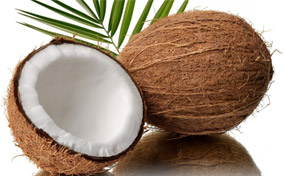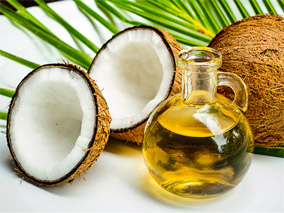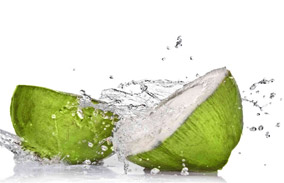Issue :- 9

Health Benefits of Coconut
Coconuts are one of the wonder foods on earth that amply provides for all human needs and have multiple health benefits… They can even save your life!
Few people (even fewer doctors) understand how important the coconut is to stabilizing blood sugar; lowering cholesterol; healing; hydration; and even replacing blood plasma in an emergency.
Referred to as kalpa vriksha (Sanskrit for “the tree that supplies all that is needed to live”) in ancient India, the coconut palm has been recognized as a top immune booster, antifungal, antibiotic, antiviral and antibacterial remedy for thousands of years all over the world.
Yet, it has been only recently that modern researchers have begun to fully discover the massive coconut health benefits this amazing fruit seed offers.
To give just one example of coconuts’ life-saving properties, they were used extensively in the Pacific during World War II. Since blood plasma supplies were scarce, it was very common for medics to siphon pure coconut water from young coconuts to be used as emergency plasma transfusions for soldiers who were injured. Since coconut water is nearly identical to human blood, it was suitable for people of all blood types.
Because of its strong antioxidant properties and health benefits, the coconuts can be used to:
- Lower cholesterol
- Improve digestion
- Ward off wrinkles
- Stabilize glucose levels
- Fight off viruses
- Build cells
- Regulate hormones
- Increase thyroid production
- Lose weight
- Increase metabolism
- Fight infections
- Stave off memory loss
- Kill bacteria
- And more!
Considered one of the most treasured foods of all time, coconut products — including coconut flesh, coconut water, coconut oil, and coconut cream — each deliver superb health benefits.
Coconut oil, for instance, is considered the best and safest oil to use for cooking — even superior to extra virgin olive oil when it comes to giving the body what it needs for optimum health. Unlike other fats and oils that we typically use for cooking and baking, coconut oil does not form polymerized oils or dangerous trans fatty acids in our bodies, which can raise our cholesterol levels; clog our arteries and even make our skin sag and wrinkle. Plus, this ultra-safe oil can give your body important antioxidants that can help build stronger cells and improve your overall health and well being.
Coconut health benefits found all-in-one
Here are a few ways that you can take advantage of coconut products to stave off disease and to recapture the look and feeling of youth:
Coconut Water – The coconut is a natural water filter. It takes almost 9 months for a coconut to filter every quart of water stored within its shell. This makes the resulting coconut water completely pure and sterile, which is one reason why it can be used for blood transfusions.
Another benefit of coconut water is the fact that it has the highest concentration of electrolytes than anything else found in nature. This makes it an excellent source of hydration.
Coconut Oil – In addition to being superior for cooking and baking, coconut oil also makes superb topical oil that can help to naturally rid the skin of dangerous toxins. It also gives the skin the perfect mix of hydration and antioxidants that it needs to stay healthy, smooth and younger-looking longer.
Another great benefit of coconut oil is in protecting your teeth from the bacteria that can cause cavities and disease. Simply rubbing a little fresh coconut oil on your gums and teeth can keep them stronger and healthier than virtually any other dental treatment.
Most people don’t realize that coconut oil can actually help you lose weight! Yes, simply changing your cooking oil from the unsaturated fat variety to coconut oil can help you lose those extra pounds.
Here’s why: Unsaturated fats found in canola, corn and other vegetable oils, as well as margarine suppress the metabolism, which makes it harder to lose weight — and easier to gain it. Over time, this metabolism suppression may result in 20-30 pounds of excess weight that your body cannot get rid of. Coconut oil, on the other hand, helps to increase thyroid function and boost your metabolism — 2 important components to shedding unwanted pounds.
Coconut Cream – The best skin treatment product one can use to achieve flawless skin may quite possibly be coconut cream. Unlike traditional skin creams which can actually introduce fats and oils to the skin that will break it down over time, making it look older, creams derived from the coconut can actually replenish the skin, giving it a more youthful and healthy glow than most other skin care products on the market.
When it comes to buying coconut products, coconuts are not all created equal. Wild coconuts are always best, but can be hard to obtain if you don’t live in a tropical country. Whether you are using this wonder food to boost your immune system; increase your metabolism or fight wrinkles, using products from young coconuts will help you reap the most benefit.
Young coconuts contain the purest unsaturated fat, compared to the fat found in the more mature varieties. This is why they offer the most rejuvenation properties for the body’s tissues. But how can you tell how old a coconut is? Young coconuts are usually green in color and oddly shaped. The brown hairy ones are mature coconuts, and while they offer a lot of healthy benefits, they aren’t nearly as good for you as younger varieties.
The best place to find young fresh coconuts is, of course, in the markets of the tropics, so be sure to seek them out if you travel to those areas considering all the health benefits from a coconut. Coconut-producing regions export coconuts all over the world so it’s relatively easy to find coconuts at your local health food store or Asian grocer.
10 Proven Health Benefits of Coconut Oil

Coconut oil is one of the few foods that can be classified as a “superfood.”
Its unique combination of fatty acids can have profound positive effects on health.
This includes fat loss, better brain function and various other amazing benefits.
Here are the top 10 health benefits of coconut oil that have been experimentally confirmed in human studies.
1. Coconut Oil Contains a Unique Combination of Fatty Acids with Powerful Medicinal Properties
Coconut oil has been demonized in the past because it contains saturated fat. In fact, coconut oil is one of the richest sources of saturated fat known to man, with almost 90% of the fatty acids in it being saturated.
However, new data is showing that saturated fats are harmless. Many massive studies that include hundreds of thousands of people prove that the whole “artery-clogging” idea was a myth.
Additionally, coconut oil doesn’t contain your average run-of-the-mill saturated fats like you would find in cheese or steak.
No, they contain so-called Medium Chain Triglycerides (MCTs) – which are fatty acids of a medium length.
Most of the fatty acids in the diet are long-chain fatty acids, but the medium-chain fatty acids in coconut oil are metabolized differently.
They go straight to the liver from the digestive tract, where they are used as quick source energy or turned into so-called ketone bodies, which can have therapeutic effects on brain disorders like epilepsy and Alzheimer’s.
Bottom Line: Coconut oil contains a lot of medium chain triglycerides, which are metabolized differently and can have therapeutic effects on several brain disorders.
2. Populations That Eat a LOT of Coconut Are Among the Healthiest People on the Planet
Coconut is kind of an “exotic” food in the Western world, primarily consumed by health conscious people.
However, in some parts of the world, coconut is a dietary staple that people have thrived on for many generations.
The best example of such a population is the Tokelauans, which live in the South Pacific.
They eat over 60% of their calories from coconuts and are the biggest consumers of saturated fat in the world.
These people are in excellent health, with no evidence of heart disease.
Another example of a population that eats a lot of coconut and remains in excellent health is the Kitavans.
Bottom Line: Plenty of populations around the world have thrived for multiple generations eating massive amounts of coconut.
3. Coconut Oil Can Increase Your Energy Expenditure, Helping You Burn More Fat
Obesity is currently one of the biggest health problems in the world.
While some people think obesity is only a matter of calories, others (myself included) believe that the sources of those calories are critical too.
It is a fact that different foods affect our bodies and hormones in different ways. In this regard, a calorie is NOT a calorie.
The medium-chain triglycerides (MCTs) in coconut oil can increase energy expenditure compared to the same amount of calories from longer chain fats.
One study found that 15-30 grams of MCTs per day increased 24 hour energy expenditure by 5%, totaling about 120 calories per day.
Bottom Line: The medium chain triglycerides in coconut oil have been shown to increase 24 hour energy expenditure by as much as 5%, potentially leading to significant weight loss over the long term.
4. The Lauric Acid in Coconut Oil Can Kill Bacteria, Viruses and Fungi, Helping to Stave Off Infections
Almost 50% of the fatty acids in coconut oil is the 12-carbon Lauric Acid.
When coconut oil is enzymatically digested, it also forms a monoglyceride called monolaurin.
Both lauric acid and monolaurin can kill harmful pathogens like bacteria, viruses and fungi.
For example, these substances have been shown to kill the bacteria Staphylococcus Aureus (a very dangerous pathogen) and the yeast Candida Albicans, a common source of yeast infections in humans.
Bottom Line: The fatty acids and breakdown products in coconut oil can kill harmful pathogens, potentially helping to prevent infections.
5. Coconut Oil Can Kill Your Hunger, Making You Eat Less without Even Trying
One interesting feature of coconut oil is that it can reduce your hunger.
This may be related to the way the fatty acids in it are metabolized, because ketone bodies can have an appetite reducing effect.
In one study, varying amounts of medium and long chain triglycerides were fed to 6 healthy men.
The men eating the most MCTs ate 256 fewer calories per day, on average.
Another study in 14 healthy men discovered that those who ate the most MCTs at breakfast ate significantly fewer calories at lunch.
These studies were small and only done for a short period of time. If this effect were to persist over the long term, it could have a dramatic influence on body weight over a period of several years.
Bottom Line: The fatty acids in coconut oil can significantly reduce appetite, which may positively affect body weight over the long term.
6. The Fatty Acids in Coconut Oil Are Turned into Ketones, Which Can Reduce Seizures
A so-called ketogenic (very low carb, very high fat) diet is currently being studied to treat various disorders.
The best known therapeutic application of this diet is treating drug-resistant epilepsy in children.
This diet involves eating very little carbohydrates and large amounts of fat, leading to greatly increased concentrations of ketone bodies in the blood.
For some reason, this diet can dramatically reduce the rate of seizures in epileptic children, even those who haven’t had success with multiple different types of drugs.
Because the MCTs in coconut oil get shipped to the liver and turned into ketone bodies, they are often used in epileptic patients to induce ketosis while allowing for a bit more carbs in the diet.
Bottom Line: The MCTs in coconut oil can increase blood concentration of ketone bodies, which can help reduce seizures in epileptic children.
7. Coconut Oil Can Improve Blood Cholesterol Levels and May Lower Your Risk of Heart Disease
Coconut oil is loaded with saturated fats, which actually do not harm the blood lipid profile like previously thought.
Saturated fats raise HDL (the good) cholesterol and change the LDL cholesterol to a benign subtype.
In one study in 40 women, coconut oil reduced Total and LDL cholesterol while increasing HDL compared to soybean oil.
There are also rat studies showing that coconut oil reduces triglycerides, total and LDL cholesterol, increases HDL and improves blood coagulation factors and antioxidant status.
This improvement in cardiovascular risk factors should theoretically lead to a reduced risk of heart disease over the long term.
Bottom Line: Studies in both humans and rats show that coconut oil improves important risk factors like Total, LDL and HDL cholesterol, which may translate to a reduced risk of heart disease.
8. Coconut Oil Can Protect Hair against Damage, Moisturize Skin and Function as Sunscreen
Coconut oil can serve various purposes that have nothing to do with eating it.
Many people are using it for cosmetic purposes and to improve the health and appearance of their skin and hair.
Studies on individuals with dry skin show that coconut oil can improve the moisture and lipid content of the skin.
Coconut oil can also be very protective against hair damage and one study shows effectiveness as sunscreen, blocking about 20% of the sun’s ultraviolet rays.
Another application is using it like mouthwash in a process called oil pulling, which can kill some of the harmful bacteria in the mouth, improve dental health and reduce bad breath.
Bottom Line: Coconut oil can be applied topically as well, studies showing it to be effective as a skin moisturizer and protecting against hair damage. It can also be used as a mild form of sunscreen and as mouthwash.
9. The Fatty Acids in Coconut Oil Can Boost Brain Function in Alzheimer’s Patients
Alzheimer’s disease is the most common cause of dementia worldwide and occurs primarily in elderly individuals.
In Alzheimer’s patients, there appears to be a reduced ability to use glucose for energy in certain parts of the brain.
Ketone bodies can supply energy for the brain and researchers have speculated that ketones can provide an alternative energy source for these malfunctioning cells and reduce symptoms of Alzheimer’s.
In one 2006 study, consumption of medium chain triglycerides led to immediate improvement in brain function in patients with milder forms of Alzheimer’s.
Other studies support these findings and medium chain triglycerides are being intensively studied as potential therapeutic agents in Alzheimer’s disease.
Bottom Line: Studies show that the fatty acids in coconut oil can increase blood levels of ketone bodies, supplying energy for the brain cells of Alzheimer’s patients and relieving symptoms.
10. Coconut Oil Can Help You Lose Fat, Especially the Dangerous Fat in Your Abdominal Cavity
Given that coconut oil can reduce appetite and increase fat burning, it makes sense that it can also help you lose weight.
Coconut oil appears to be especially effective in reducing abdominal fat, which lodges in the abdominal cavity and around organs.
This is the most dangerous fat of all and is highly associated with many Western diseases.
Waist circumference is easily measured and is a great marker for the amount of fat in the abdominal cavity.
A study in 40 women with abdominal obesity, supplementing with 30 ml (1 ounce) of coconut oil per day lead to a significant reduction in both BMI and waist circumference in a period of 12 weeks.
Another study in 20 obese males noted a reduction in waist circumference of 2.86 cm (1.1 inches) after 4 weeks of 30 ml (1 ounce) of coconut oil per day.
This number may not seem too impressive on the surface, but be aware that these people aren’t adding exercise or restricting calories. They’re losing significant amounts of abdominal fat simply by adding coconut oil to their diet.
8 Benefits of Coconut Water You Didn’t Know About

Coconut water is the ultimate thirst quencher and offers a tasty alternative to water.
This pure liquid is packed with nutrients that yield an array of health benefits. Here are 8 Benefits of Coconut Water that explain why it has become so popular:
1. Aids in Weight-loss Efforts.
The fat content in coconut water is extremely low, so generous quantities can be consumed without the fear of immediately packing on the pounds. It also suppresses the appetite and makes you feel full because of its rich nature.
2. Picture-Perfect Skin.
For those with acne or other blemishes on the surface of the skin, topical application of coconut water can go a great distance as it has the ability to clear up and subsequently tone the skin. It also moisturizes the skin from within if ingested orally and eliminates large amounts of oil. This explains why products such as facial creams, shampoos, conditioners and lotions that contain traces of coconut extract are more effective.
3. The Ultimate Hangover Remedy.
Next time you overdo it and drink more than your belly can handle, consume coconut water to settle your stomach. It will also replace those essential electrolytes that exit the body if you experience bouts of frequent urination and vomiting.
4. Facilitates Digestion.
If you constantly encounter difficulty during the digestion process, coconut water may provide a source of relief. Because of its high concentration of fiber, it aids in the prevention of indigestion and reduces the occurrence of acid reflux.
5. Boosts Hydration.
The ingredients in coconut water are way more effective at hydrating the human body than those of sports and energy drinks. During rigorous exercise or extended periods of physical activity, the human body loses mineral-rich fluids. However, coconut water serves as an excellent replacement medium with 294 mg of potassium and 5 mg of natural sugar per glass, unlike your favorite sports drink that only contains half of the potassium content and five times the amount of processed sugar. In addition, the sodium count is only 25 mg, which is relatively low compared to the 41 and 20 mg found in sports drinks and energy drinks respectively.
6. Reduces Blood Pressure.
In many instances, a disproportionate level of electrolytes can result in high blood pressure. Because coconut water contains an adequate supply of each, it can be used as a balancing mechanism. In some instances, it is recommended that coconut water be consumed at the start of each day to foster the balance of these electrolytes.
7. Rich in Nutrients.
Unlike any other beverage on the market, coconut water contains five essential electrolytes that are present in the human body. These include: calcium, magnesium, phosphorous, potassium and sodium. Because of its unique composition, coconut water can be enjoyed by individuals with varying medical conditions.
8. Compatible with Human Blood.
Since it is isotonic to human plasma, coconut water can be used in extreme emergencies to quickly rehydrate the human body if administered intravenously. It is not uncommon for the drink to be used in poorer, third-world countries to save human lives.
Nutrition chart of Coconut:
Coconut (Cocus nucifera), Fresh, Nutrition Value per 100 g (Source: USDA National Nutrient data base)
| Principle | Nutrient Value | Percentage of RDA |
| Energy | 354 Kcal | 18% |
| Carbohydrates | 15.23 g | 12% |
| Protein | 3.3 g | 6% |
| Total Fat | 33.49 g | 167% |
| Cholesterol | 0 mg | 0% |
| Dietary Fiber | 9 g | 24% |
| Vitamins | ||
| Folates | 26 µg | 6.5% |
| Niacin | 0.540 mg | 3% |
| Pantothenic acid | 0.300 mg | 6% |
| Pyridoxine | 0.054 mg | 4% |
| Riboflavin | 0.020 mg | 1.5% |
| Thiamin | 0.066 mg | 5.5% |
| Vitamin C | 3.3 mg | 5.5% |
| Vitamin A | 0 IU | 0% |
| Vitamin E | 0.24 mg | 2% |
| Vitamin K | 0.2 µg | 1% |
| Electrolytes | ||
| Sodium | 20 mg | 1% |
| Potassium | 356 mg | 7.5% |
| Minerals | ||
| Calcium | 14 mg | 1.4% |
| Copper | 0.435 mg | 48% |
| Iron | 2.43 mg | 30% |
| Magnesium | 32 mg | 8% |
| Manganese | 1.500 mg | 65% |
| Phosphorus | 113 mg | 16% |
| Selenium | 10.1 µg | 18% |
| Zinc | 1.10 mg | 10% |
| Phyto-nutrients | ||
| Carotene, beta | 0 µg | -- |
| Phytosterols | 47 mg | -- |
Nomination form for 2020 Global Awards
https://www.unaniherbal.org/nomination-form.html
For Consultation click here
Copyright 2014 Unani Herbal
If you wish to cancel your subscription to this newsletter click here






